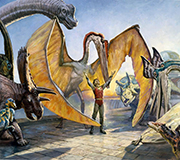For me, the proposal to run for president of the federation was rather a challenge: I got the opportunity to apply my experience and abilities for the benefit of developing chess, which I could not even dream of. But it also meant the necessity to voluntarily take on such a burden of care, from which people, who knew about chess and chess players much more than I did, tried to keep away. And on top of it I had to perform my main duties as the head of Kalmykia.
Explanatory and etymological dictionaries claim that the word "chance" has a very ancient origin. It came to us from the lexicon of the French lovers of the game of dice. They brought it out from the time of the Roman Empire, where their colleagues used the term "calentia", meaning the result of the throw. And those, in turn, produced it from the verb “cadere”, to fall.
Is it because of this that people believe that a “happy opportunity” should fall into their hands by itself, without any effort? But I prefer a different attitude to the concept of “opportunity”, close to the one about which Vladimir Vysotsky sang in one of his military songs: “Chances fly like bullets / Crazy, belated, blind, worn out / Some of us took the risk of catching them / And instantly: some are in the grave and some are in honour.”
Let us not concentrate on the minor mood of these stanzas – à la guerre comme à la guerre – but their essence is true. Chance, opportunity is not at all a happy event, but a challenge. And if you are not able to answer it, you can only blame yourself.
Each of us can think offhand about half a dozen examples when people lost their chance. One managed to become a big official, the second found a business gold mine, the third had a great talent, the fourth was just lucky to win big money in the lottery. So what? Less than ten years later, a partying lifestyle, alcohol and drugs brought them to poverty and eventually to the grave.
Apparently, many of us subconsciously understand that a chance is not a free gift at all. And that’s why they are afraid of opportunities and difficulties that it brings about. It is probably normal to be afraid of difficulties. When it concerns one person only.
Big problems begin where this fear plagues entire communities and even species.
Do you remember the story of dinosaurs? They dominated the planet for more than one and a half hundred million years. From school, we used to think of them as huge, cumbersome, stupid, and evil creatures with brains the size of a walnut. But the latest data from palaeontologists suggests that they (at least some of them) had all the prerequisites for developing intelligence: warm blood, erect walking, fairly developed forelimbs, a not so small brain and even a social structure. Then one day the dinosaurs faced a challenge that gave them a chance to make a step forward along the evolutionary ladder. But they chose a simpler way.
Want to see dinosaurs in their natural habitat right now? Look out the window, there they are: birds pecking crumbs scattered by kind-hearted old women...
More than thirty years ago, the leaders of the USSR and the USA, Mikhail Gorbachev and Ronald Reagan, gave the world a chance to get rid of the fear of an all-destroying nuclear war. Then the Treaty on the Elimination of Intermediate-Range and Shorter-Range Missiles, which they signed, was greeted as the first, most difficult and important step towards getting rid of this nightmarish threat. Alas, it became the last. The nuclear race did not stop, more and more countries held weapons of total annihilation, and now Washington puts an end to the INF Treaty. And, according to many experts, this is not at all done out of fear of Moscow, no matter what American politicians assert.
Yes, speaking of the risk of a nuclear conflict, we first of all recall Russia and the United States, but India and Pakistan have much more mutual claims, which are much sharper. Both countries directly border each other, and therefore the risk is higher. And there are much more such geopolitical pairs, armed with a non-peaceful atom, on our planet than it is able to endure.
It turns out that we, all of humanity, are afraid of the challenge of building a world in which nations and states would trust each other enough to not even dream of the total destruction of their opponents.
Is this why Jesus Christ, who brought almost the most human-loving teaching to the world, sadly warned: “Do not think that I have come to bring peace to the earth; I did not come to bring peace, but a sword ”(Matt. 10:34). The Saviour knew that the opportunity that came with him would frighten many away, for such is human nature. And fear, as it is, forces one to attack first.
But what is interesting. One of the most popular theories of quantum physics is Hugh Everett’s ‘multiworld interpretation of quantum mechanics’. Omitting complex scientific explanations, I note that one of his conclusions suggests that each time you make a choice; you actually choose all the possible options. However, those options that you discard are realized not in this world, but in parallel universes, as real as our own.
Thus, in general, the world does not care what choice you personally made, whether you used your chance or answered the challenge: in some of the universes it is realized all the same.
And, in the same way, the universe is indifferent, whether humanity will survive on this particular Earth and in this particular world: somewhere it will continue to flourish, somewhere it will learn to live in peace and harmony. However, I somehow am not very happy with the vague "somewhere."
























